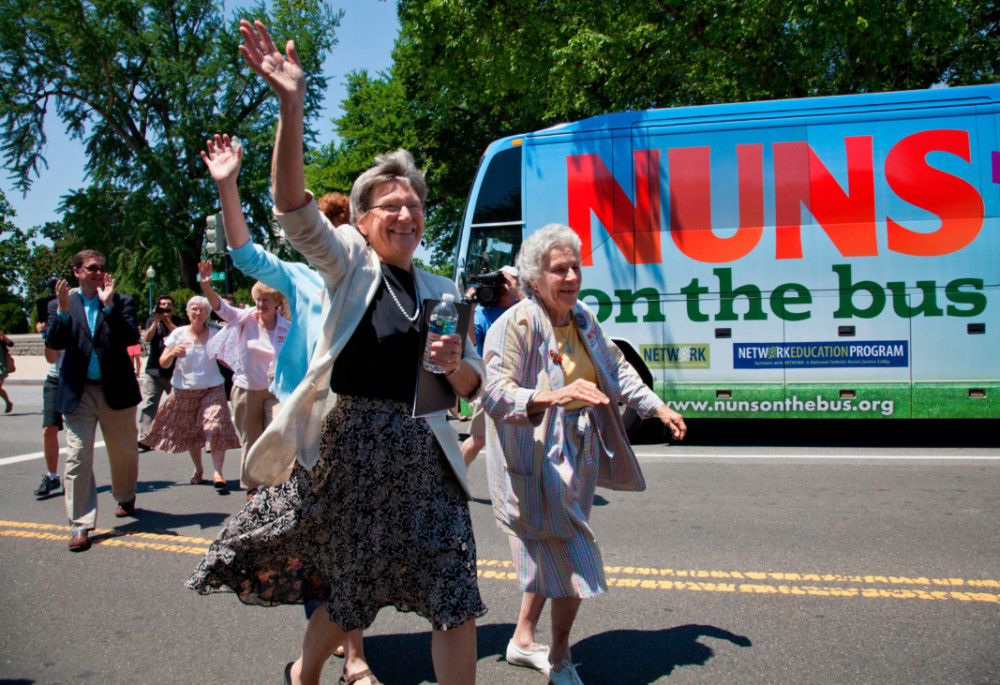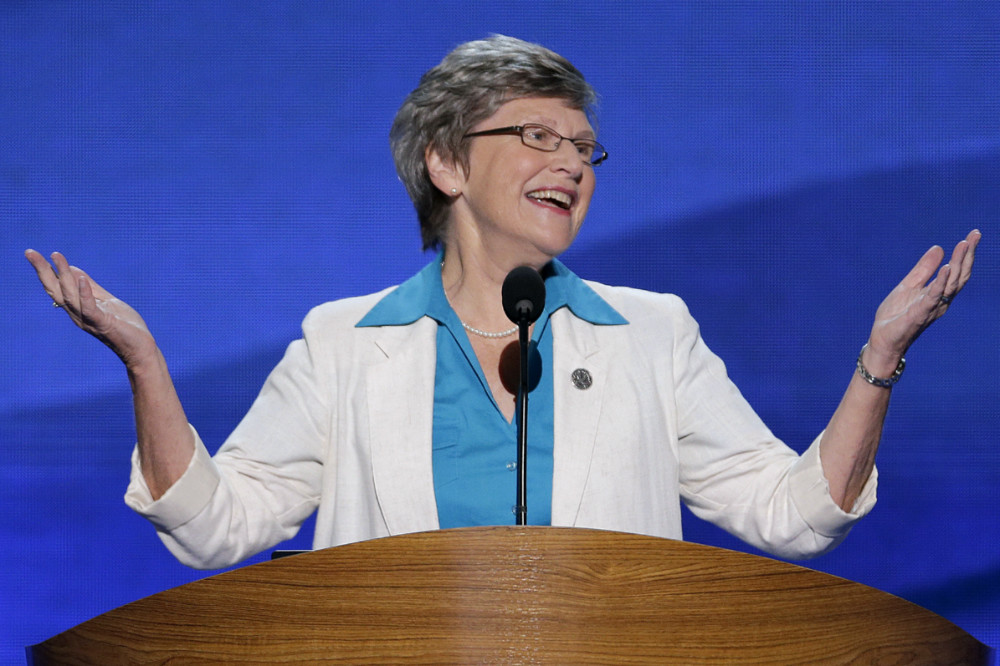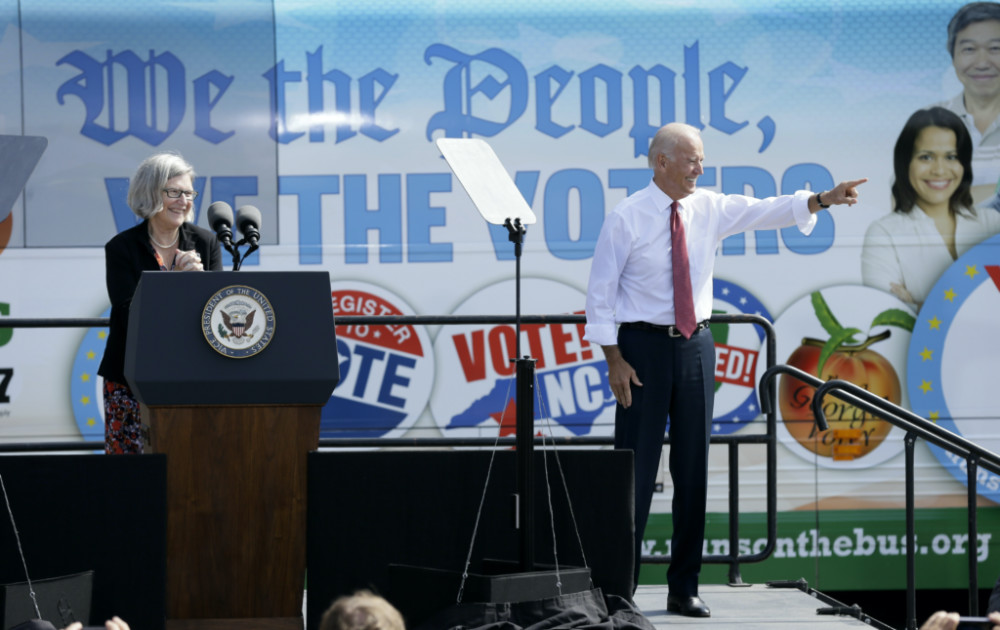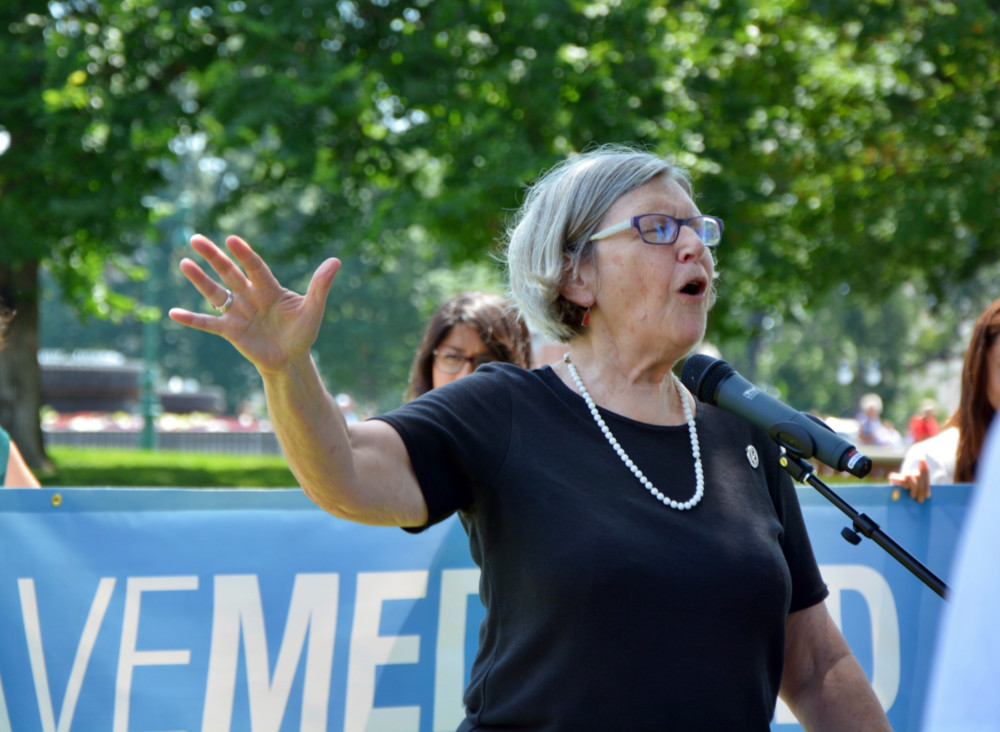
JACK JENKINS, of Religion News Service, speaks to Sister Simone Campbell, head of social justice lobby Network, as she steps down this month…
Washington DC, US
RNS
When Sister Simone Campbell first joined Network, a Catholic social justice lobby, in early November of 2004, it was not a happy time for liberal-leaning Catholics like herself. The day after she started, she watched presidential election returns showcasing a rout of Catholic Democratic Senator John Kerry at the hands of George W Bush and his throngs of conservative Christian supporters, including many Catholics.
“There was a lot of soul searching in the progressive faith community,” said Campbell, a member of the Sisters of Social Service, where she adopted the name “Simone”.
The defeat frustrated Campbell for many reasons. But one thing grated on her in particular: a popular narrative that framed US Catholics as single-issue voters, motivated primarily by opposition to abortion instead of additionally animated by what she sees as crucial religious concern for the poor, for immigrants, for universal access to health care.
Sixteen years later, as Campbell prepares to step down this month from her post as head of the organisation credited with helping pass landmark pieces of liberal legislation, the Roman Catholic nun told Religion News Service she believes she helped chip away at that narrative among voters and clerics alike – but only by “being an instrument” of the Holy Spirit.

Sister Simone Campbell, executive director of the Roman Catholic Social Justice Organization, addresses the Democratic National Convention in Charlotte, North Carolina, on Wednesday, 5th September, 2012. PICTURE: AP Photo/J Scott Applewhite/File photo.
Campbell has been striving to listen to that spirit ever since she got her start lobbying the California government while running a low-cost legal services centre in Oakland, California, that catered to the working poor. Over the course of her nearly two decades at the organisation, she learned the power of invoking faith while pushing lawmakers in Sacramento to pass legislation regarding child support and other issues. One of her campaigns assigned a “sponsor nun” to pray for lawmakers, spurring some to descend into tears or rattle off confessions.
She made ample use of this unique lobbying style – a mixture of the spiritual, political and personal – when taking the helm at Network years later. One of her early campaigns involved the war in Iraq, when she felt the debate among members of Congress ignored the human toll of the conflict.
She made ample use of this unique lobbying style – a mixture of the spiritual, political and personal – when taking the helm at Network…One of her early campaigns involved the war in Iraq, when she felt the debate among members of Congress ignored the human toll of the conflict.
“The only things being discussed were the military and military options,” she said.
Network sponsored a delegation to Washington of 10 Iraqi women who were able to speak with lawmakers there about the personal impact of the war on women and children who lived in war zones.
The power of those encounters, Campbell said, got results.
“They quietly helped get some funding for development by Iraqis for Iraqis – really community-based development funding,” Campbell recalled.
Campbell worked to push a different vision of politics beyond Capitol Hill as well. She pointed to when Network hosted a forum during the 2008 election to discuss a “platform for the common good”. The forum, which took the form of a convention hosted in Philadelphia, included a video message from then-candidate Barack Obama.
“There was so much energy and so much excitement,” she said, noting they invited Obama’s Republican opponent, the late Senator John McCain, but never heard back. “It was a powerful moment that then helped mobilise the Catholic vote in a way that was significant.”

Sister Simone Campbell, left, and Sister Diane Donoghue, right, lead the way as the the “Nuns on the Bus” arrive on Capitol Hill in Washington, on 2nd July, 2012, after a nine-state tour to bring stories of hardship to Congress. Sister Simone Campbell is executive director of Network, a liberal Catholic social justice lobby in Washington. PICTURE: AP Photo/J Scott Applewhite/File photo.
But if there is one thing Campbell is unequivocally proud of during her tenure at Network, it’s her organisation’s role in the passage of the Affordable Care Act. Campbell and Network were part of a large group of US Catholic nuns who voiced support for the health care bill before its passage – a move in direct defiance of the US Conference of Catholic Bishops, which came out against the bill.
“Obviously the highest pinnacle is the ACA,” she said.
So crucial was the nuns’ support for the bill that Campbell was even invited to the signing ceremony, where she shared a pastoral moment with then-Vice President Joe Biden.
Support among nuns for the ACA – which President Barack Obama declared in 2015 was key to the bill’s passage – was not without cost. The public effort triggered backlash from the Catholic hierarchy and was thought to be a catalyst for an investigation of US Catholic nuns launched by the Vatican in 2012 that singled out Network. (The investigation was discontinued under Pope Francis.)
But, Campbell maintains, the pressure only raised Network’s profile and drew additional media attention when the group launched yet another campaign: a cross-country “Nuns on the Bus” tour that decried a federal budget put forth by the Republican-run Congress and then-House Speaker Paul Ryan, because, according to Network, it proposed gutting federal programs that help the poor.
“The reason the bus happened was because we were in the shadow of all that controversy and had been named by the Vatican as being a bad influence.”
– Sister Simone Campbell, speaking of the “Nuns on the Bus” tour.
“The reason the bus happened was because we were in the shadow of all that controversy and had been named by the Vatican as being a bad influence,” she said.
Campbell also revealed for the first time that tension with the bishops and her belief in a broader Catholic social ethic also played into the bus tour launch date: The tour, she explained, purposely began shortly before the USCCB launched a “Fortnight for Freedom” campaign that voiced opposition to elements of the ACA and called Catholics to pledge to support religious liberty.
“Part of the reason we worked so hard and so fast was because I wanted to get on the road first,” she said.
The era, which included Campbell delivering an address at the 2012 Democratic National Convention that garnered a standing ovation, was marked by heated public debate between Campbell and Republican lawmakers such as Ryan. Despite the friction, Campbell says she now looks back on the period with unexpected fondness.
“When I first came there was at least the capacity to have conversations about the needs of the people — alternative ways forward,” she said. “I could argue with Paul Ryan.”
But recent movements within the modern Republican Party, she argued, have shifted the dialogue away from the policy debates she had grown accustomed to.
“Republicans don’t have a platform, they don’t have policy,” she said. “You can’t bolster an argument, effectively, because they have no anchor.”

Vice President Joe Biden greets supporters with Sister Simone Campbell, left, during the kickoff of the Nuns on the Bus tour, on Wednesday, 17th September, 2014, at the Statehouse in Des Moines, Iowa. PICTURE: AP Photo/Charlie Neibergall/File photo.
Change has also come in the form of Pope Francis, whose public witness has emphasised different issues – especially poverty, immigrant rights and climate change – than his predecessor Pope Benedict XVI. His concerns overlapped heavily with those of Network, effectively bolstering their work and complicating the criticism of their conservative detractors. (“It’s harder for them to deal with Pope Francis,” she said.)
Campbell and her team did their best to return the favor: During the Pope’s visit to the US in 2015, the Vice President’s staff gifted the pontiff’s team with an iPad filled with stories of people struggling with poverty and low-income wages – complete with Spanish subtitles – collected by Network.
“When Pope Francis addressed Congress [in 2015], he said, ‘I am a bridge and I urge all…to be bridges,’” Campbell recalled. “We had just done this whole bus trip in advance of his visit. It was sort of like Paul Revere going out, saying the Pope’s coming. We went to not-so-Catholic parts of our nation to bring the message, and our message, our title, our theme, was ‘bridge the divides.’ I felt seen by him.”
Through it all, Campbell notes, her staff has maintained a spiritual, often pastoral, connection to lawmakers on Capitol Hill that echoes her early days in California. She recounted a call she fielded last summer from House Speaker Nancy Pelosi. Pelosi, a fellow Californian and Catholic who has spoken at Network events and celebrated Campbell’s work, expressed frustration the faith community wasn’t doing more to push forward a relief bill to help people struggling during the pandemic.
Campbell noted Network and others had been doing advocacy on the issue but was suddenly struck by an epiphany that had hit her many times before.
“[The media] has begun to engage the simplistic lie that we are single-issue voters,” she said. “It’s gotten some traction…it’s becoming a little more public.”
– Sister Simone Campbell, speaking about the idea that Catholics are multi-issue voters.
As her time at Network ends, Campbell noted an element of symmetry. Sixteen years after she assumed her post, she is leaving just as she arrived: around the time of an election.
But the Religious Left was resurgent this time around, and her organisation had ample opportunity to push back against the narrative that has irked her since the beginning. Network, sporting a new political arm, bought $50,000’s worth of digital ads to target Catholic voters in swing states such as Florida, Pennsylvania, Michigan, Wisconsin and Arizona.
Their message: calling on Catholics to be “Pope Francis voters” and to cast their ballot by weighing a host of issues – not just abortion. This was in addition to Network town halls dedicated to the idea that Catholics are multi-issue voters.
“[The media] has begun to engage the simplistic lie that we are single-issue voters,” she said. “It’s gotten some traction…it’s becoming a little more public.”
And unlike 2004, the liberal Catholics didn’t lose. Biden won the presidency after waging a campaign that was unapologetic about his Catholicism, and he managed essentially to split the Catholic vote with Donald Trump overall – an improvement over Kerry’s numbers in 2004.
He likely benefitted from a powerful conversation partner: Campbell was in contact with the highest levels of the Biden campaign during the primary season and offered a prayer at the 2020 DNC.

Sister Simone Campbell speaks at a June 2017 protest outside the US Capitol. The protest was against the Republican-led effort to repeal and replace the Affordable Care Act. PICTURE: RNS/Jack Jenkins
Campbell said she’s sad to leave Network, likening it to the Biblical story of Moses remaining on the mountain instead of following the Israelites into the Promised Land. Even so, she looks forward to a pending sabbatical, hinting that she’s likely not done with advocacy just yet and expressing optimism about Network’s future.
“I think a sign that it’s the right time is that it’s kind of exciting,” she said. “I’m excited to see what it will do next.”
Asked if, looking back, she would do anything differently, Campbell explained that her spiritual practices – especially her engagement with the Holy Spirit, which she said has guided her work and life – give her a sense of peace about it all.
“It goes back to my basic spiritual life of no fear, no grasping, no holding on,” she said. “If I held on to stuff, then I don’t trust the spirit to be present in whatever it is, whatever harebrained scheme I’m in the middle of.”





